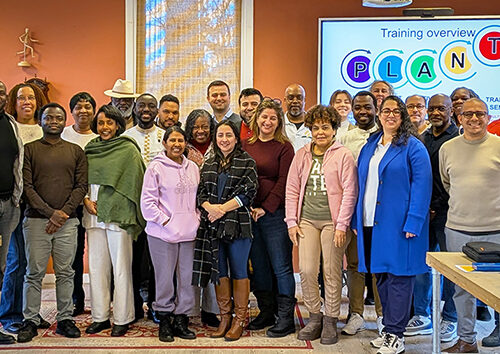7 February 2019 | Riga, Latvia [Alla Nõmmik]
Sixty departmental leaders and their teams across Estonia, Latvia and Lithuania now have greater understanding in dealing with mental health issues thanks to a three-part series run in the Baltic Union over the past year.
 The final module, run at the Church headquarters in Riga, Latvia, the last weekend of January, actually attracted more participants as interest in the course grew. The rationale behind the course, run by Karen Holford, TED Family Ministries director, and Torben Bergland, Associate Health director at World Church headquarters, is that church leaders are all actively involved in communication with church members and people from the surrounding communities.
The final module, run at the Church headquarters in Riga, Latvia, the last weekend of January, actually attracted more participants as interest in the course grew. The rationale behind the course, run by Karen Holford, TED Family Ministries director, and Torben Bergland, Associate Health director at World Church headquarters, is that church leaders are all actively involved in communication with church members and people from the surrounding communities.
We live in a sinful world among broken people, and the church is no exception in experiencing that brokenness. What can we do to help those around us? What can we do to help ourselves?
The answer is that we can learn to listen, to understand, and to be compassionate. Paul says, “Be kindly affectionate to one another with brotherly love … Rejoice with those who rejoice, and weep with those who weep.” (Romans 12:10, 15)
Holford explained that “Mental wellness is an important issue because it touches all of our lives in some way. Loneliness, broken relationships, and stressful lifestyles are just a few of the factors that can increase the risk of mental unwellness and distress in our lives as well as the lives of those we love, and the community around us.”
The course is intended to upgrade participants’ people skills; to help them to understand some most common mental challenges people face, to be good peacemakers and listeners, to understand emotions and people’s relational needs, and to equally learn some practical tips for supporting both yourself and others in the times of crises.
As a short course there is too little time to go deeply into each topic, but both Bergland and Holford carefully and practically give a general overview. This was very much appreciated by the participants, some of whom opened up during this third module to share that what they had learnt was already making a practical difference in their lives and the lives of others.
 The feedback forms included comments like, “Just in time!” “It opened my eyes about addictions.” “Very useful information – practical and relevant.” “Very real! I needed more information.” “Vitally important topics!” “I have learnt to build healthy relationships.” “Very professional lecturers.”
The feedback forms included comments like, “Just in time!” “It opened my eyes about addictions.” “Very useful information – practical and relevant.” “Very real! I needed more information.” “Vitally important topics!” “I have learnt to build healthy relationships.” “Very professional lecturers.”
One task during the course was a special home assignment, to think about and write down their personal life narrative in order to see God’s leading in it. They then shared their personal testimonies in groups during two modules.
These discussions became points of mutual connection and acts of worshipping God as the Ruler of the Universe, who at the same time is their personal Saviour; and who has a good plan for the lives of each one of us. Participants responded that “Learning through mingling with colleagues and ministers is very good; to know their struggles, hopes and expectations.” Another added, “I liked this part, My Story. I learned to be more attentive to the pain of others. Relationships are most important.”
There is still learning to do. Participants expressed an interest to learn about addictions – how to help people (and especially youth) with different addictions, how to organise groups and support healing. Many other topics they are interested in include burnout, how to deal with criticism, health coaching, emotional intelligence, depression and self-awareness.
 Many participants pointed out intergenerational worship as a topic they would like to learn more about and implement in their churches. One interesting topic suggestion stood out from others – anxiety and its relation to Adventist eschatology.
Many participants pointed out intergenerational worship as a topic they would like to learn more about and implement in their churches. One interesting topic suggestion stood out from others – anxiety and its relation to Adventist eschatology.
There is always some way to improve. While participants were generally very happy and grateful for the course, they equally expressed a desire for longer discussions, practical exercises, and more time for questions and answers. As a solution they suggested to have questions and materials sent beforehand, and to conduct online courses in between face-to-face meetings. One participant also felt that this kind of course could be conducted for a bigger audience.
“Some participants told me that what they learned about emotional balance and strengthening relationships had already inspired them to make changes in their lives and to build stronger connections with their own family members,” Holford stated at the end of the course. “This is where we can start to make the most difference, and the ripples of healthy relationships and joyful lives will spread out to bring love and joy to others too.”
tedNEWS Staff: Victor Hulbert, editor; Sajitha Forde-Ralph, associate editor
119 St Peter’s Street, St Albans, Herts, AL1 3EY, England
E-mail: [email protected]
Website: www.ted.adventist.org
tedNEWS is an information bulletin issued by the communication department of the Seventh-day Adventist Church in the Trans-European Division. Readers are free to republish or share this article with appropriate credit including an active hyperlink to the original article.



